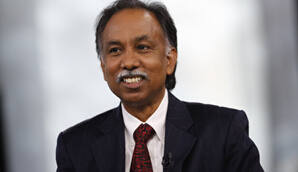
Corporations across the world and the leaders at its helm are often seeking answers to a much-debated question: What are the ideal qualities of a leader? There is no dearth of answers that one can find on this topic. For a simple reason that there are no easy answers. There isn’t a “one size fits all” response. In my own leadership journey spanning over three decades, my experience has been no different. Every corporation and every leader, I believe, discovers leadership qualities through their own unique journeys. What works for one may not necessarily work for another. What I have come to understand is that while certain fundamental qualities of a leader are time and context invariant, there are others that need to evolve with the changing times.
全球众多公司及其掌门人常常苦苦求解的一个问题是:领导者应具备哪些品质?这个话题历来都是众说纷纭,各执一词。它之所以不容易解答,原因很简单,即没有什么“一码通吃”的答案。在我三十多年的领导生涯中,我的体会也是如此。我深信,每个公司和每位领导者都会通过自己独特的领导历程发现领导者所应具备的各种品质。适合某个领导者的经验对另一个领导者可能并不适用。不过我已经明白,尽管领导者的某些基本品质不随时间和环境而变,但确实有一些品质需要与时俱进。
The primary role of a leader is to inspire hope. Leaders have a responsibility to raise the aspirations of their people and enable them to realize those aspirations. They have to lead by example and have to conduct themselves with fairness, honesty and integrity. Needless to say, they need to possess the required business acumen that comprises a deep understanding of current realities and also a firm view on the emerging future. This business acumen is much-needed to enable them to balance short-term organizational priorities with its long-term vision and to build an organization that will stand the test of time. I could talk at length about these widely acknowledged prerequisite qualities of a leader but I will focus on talking about the qualities that are most relevant today.
领导者的首要职责就是激发希望。领导者有责任唤起人们的希望,同时还要让他们能够实现梦想。他们必须以身作则,行事公平、诚信而正直。毋庸置疑,他们必须拥有商业所必需的聪明才智,而这离不开对现实的深入理解和对未来趋势的坚定认识。他们非常需要这种商业智慧来平衡组织的短期目标和长期规划,同时打造一个能经受时间考验的企业。对于这些广受认可的领导者必备品质,我可以大谈特谈,但现在我将主要探讨一下对今天来说最重要的一些品质。
Trust
信任
The events that led to the recent global economic crisis made it widely acknowledged as the crisis of trust. One of the most important qualities that business leaders today, in the post-crisis era, need to possess is the ability earn and build trust – within their organization and outside. Building trust is not an end-state but a continuous journey. At the organizational level, it necessitates the institutionalizing of robust governance mechanisms that promote transparency and ethical conduct. At the personal level, it requires business leaders to have the courage to tell the truth and the humility to say ‘sorry’ when needed. In essence, business leaders need to earn the right to operate by earning the trust of all their stakeholders.
因为引发近年来席卷全球的经济危机的一些事件,这场危机也普遍被看成是一场信任危机。而在后危机时代,如今的企业领导者最需要具备的重要品质之一就是在企业内外赢得并建立信任。建立信任并不是最终状态,而是一个持续不断的过程。在企业层面,它促使企业必须建立坚实可靠的治理机制。这有助于增强透明度,使行为符合道德规范。在个人层面,它要求企业领导者有勇气说真话,在必要时也能谦卑地说“抱歉”。实际上,企业领导者需要只有赢得所有利益相关者的信任,才能获得掌管企业的权利。
Courage
勇气
In a little over the past decade alone, I have been witness to three major crises – the Asian financial crisis, the dotcom bubble burst and the most recent global economic meltdown. It is without doubt that such crises are an inevitable part of business and the frequency of their recurrence is only going to increase. The recurring crises notwithstanding, the socio-economic and political environment in which businesses operate in today is becoming increasingly dynamic and complex. Business leaders therefore need nothing short of nerves of steel to take these multiple challenges head-on and keep marching forward. They need to be in control at all times and instill a sense of hope and courage, particularly in the face of adversity. As they say, when the going gets tough, the tough get going. There hasn’t been a better time to use this cliché.
仅仅在过去十几年间,我就亲眼目睹了三场重大危机——亚洲金融危机,互联网泡沫破裂,及最近的全球经济危机。毫无疑问,这类危机本来就是商业不可避免的一部分,并且卷土重来的次数只会不断增加。然而危机一再发生,而企业运营的社会经济及政治环境也正在变得越来越动荡复杂,因此企业领导者需要钢铁般的意志,才能应付眼前的多种挑战并奋力前进。他们需要始终掌控大局,同时激发人们的希望和勇气,在面对逆境时更要如此。正如俗语所说,时势艰难时,铁腕当道日。这句话用在眼下尤其适用。
Big picture view
大局观
There are various schools of thought when it comes to what business leaders should dedicate a substantial amount of their time to. There is one school of thought that believes business leaders need to focus largely on anticipating and preparing for the future. Another school of thought emphasizes on the common adage – “the devil is in the details.” In other words, business leaders need to be hands-on when it comes to understanding and shaping the realities on the ground. My own experience has taught me that business leaders need to embrace both – a focus on the larger picture and an attention to details. An idea without an effective implementation plan is of little value. Business leaders therefore need to be able to understand and contribute to all aspects of business – be it strategy, operations, finance or marketing. In essence, business leaders today need to be comprehensive in their approach and in the competencies they acquire. As demanding as it may sound, they are increasingly expected to be a jack of all trades and master too.
就企业领导者应将主要精力致力于何事这一问题历来有几种观点。一种观点认为,他们的主要职责是展望未来,同时为未来做好准备。另一种观点则强调了那句老话——“细节决定成败”。换言之,在理解并脚踏实地地塑造现实上,领导者必须亲力亲为。从我自己的经历看,企业领导者必须两者兼顾——既能仰观大局,又能俯察细节。光有理念,但却缺乏有效的执行方案可谓一钱不值。因此,对于企业运营的方方面面,企业领导者都必须深刻理解并能贡献才智——无论是战略、运营、财务还是营销,莫不如此。说到底,如今的企业领导者无论是行事方法还是本领能力,都要综合全面。尽管这个要求看似苛刻,但人们确实越来越希望他们能事事精通。
To conclude, I will reiterate my belief that leadership is a journey of lifelong learning. There are no mantras to success that are cast in stone. There are a few leadership qualities that stand the test of time but others which need to evolve and be embraced with the changing times. Business leaders need to embark on this journey of discovery called leadership with openness, courage and humility. The destination is certainly going to be worthwhile.
总之,我要重申自己的信念,即领导力需要终生不懈的学习。要想成为成功的领导者,并没有什么金科玉律。有少数领导者品质能够经受时间考验而历久不衰,但其他品质却要与时俱进。企业领导者要抱着开放的心态,满怀勇气并保持谦逊地踏上这条叫做领导力的发现之旅。这个旅程的终点一定会让你感到所有努力都是值得的。













